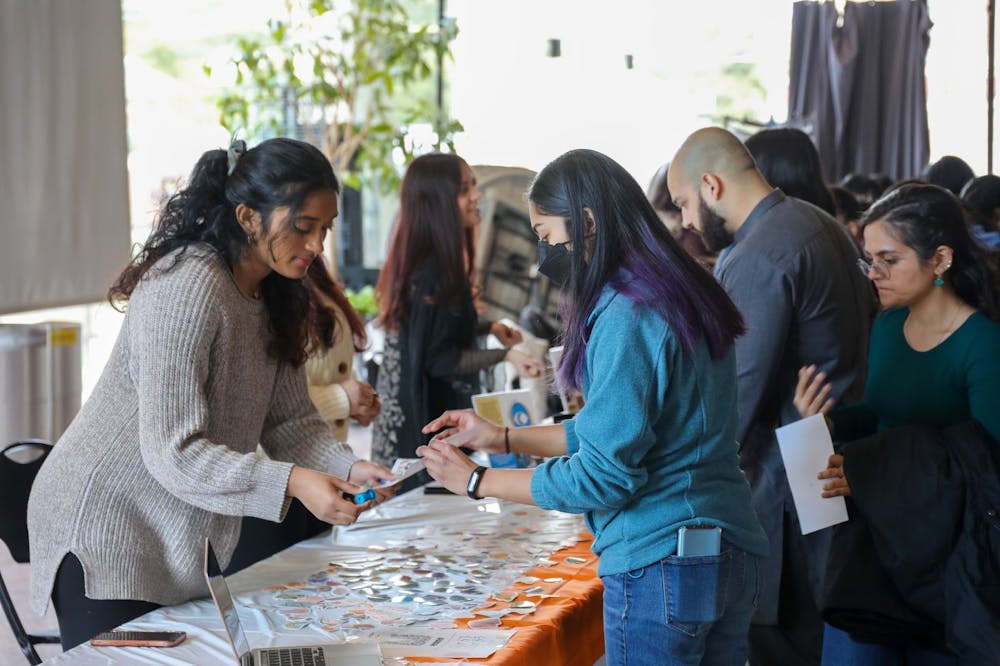The South Asian Students at Hopkins (SASH), Bangladeshi American Student Association (BASA) and Pakistani Student Association (PSA) co-hosted a mela (Sanskrit for “fair”) to celebrate the cultures of South Asian students on March 11.
At the mela, students could participate in cultural activities at a variety of booths in exchange for stamps on a paper passport, which they could subsequently trade in for a variety of cultural dishes.
In an interview with The News-Letter, senior and BASA Co-President Mashiyat Ahmed explained why the BASA board proposed the idea for the event to the other cultural student groups.
“My co-president Tasfia and I were reflecting on what is missing from our experience of Hopkins as Brown students... and we realized that while we have excellent student groups like SASH and PSA, we don't see a lot of collaboration [between] the groups,” she said. “We reached out and said ‘We’re already hanging out all the time — why don’t we do this on a campus-wide scale?’”
Junior and SASH Co-President Maansi Barnwal reflected on how the event provided an opportunity for a greater number of cultures to participate than just those represented by the host clubs in an interview with The News-Letter.
“We were even able to invite students who are not part of any of our organizations, like Nepalese students, who do not have their own organization right now [but were able to come and perform],” she said.
Barnwal and her co-organizers originally planned to host the mela on Keyser Quad, but rain on March 10 forced them to make a last-minute switch to the Glass Pavilion. She explained that SASH’s focus this semester goes beyond hosting large events.
“We usually have one big [cultural] event every semester, so our goal this semester was to have those big events but also focus on advocacy,” Barnwal said. “[For] this mela, we were able to incorporate different organizations that are [working for causes like] sustainable clothing, cataract surgery and children in India.”
She also mentioned that SASH plans to hold “chai chats” with South Asian professors and invite speakers to talk about contemporary South Asian issues.
In addition, Barnwal stated that SASH’s role at Hopkins is to ensure that the organization is inclusive and creates a safe space for South Asian students.
“We're here to tell South Asian students that there is a community [they] belong to and that we want [them] to come,” she said. “[And actually], many non-South Asian students come [as well] because our culture is so colorful and welcoming.”
On the other hand, BASA, founded in 2019, is a relatively new club that struggled to stay active during COVID-19. Ahmed discussed how the group’s goals have evolved over the last two years.
“[During] COVID, the group kind of just disappeared,” Ahmed said. “Last year, we didn’t even know who the Bangladeshi students [were], so our goal was to really bring the community together, and this year [we’ve been more focused on organizing] events.”
Ahmed elaborated on how BASA is building community through conversations around identity, discussing not only what it means to be Bangladeshi in America but also within South Asia.
“It's a very unique conversation because a lot of people don't think Bangladeshi when you say South Asia — more common identities, whether it’s Indian or Pakistani, [tend to] stand out [more],” she said.
Similarly, according to freshman PSA treasurer Sami Muhammad, PSA’s role is to provide Pakistani students with a strong sense of belonging.
In an interview with The News-Letter, Muhammad highlighted how PSA has helped him feel like he belonged at Hopkins.
“When I [joined PSA], I felt like I was... back at home and... with my cousins again, and [that] made the transition much easier, especially because I'm a freshman right now and... they were the first upperclassmen I met on campus,” he said.
Muhammad expressed that PSA’s close relationship with groups representing other cultures from the same region has increased his exposure to those cultures.
“I met so many people — Bangladeshi students, Indian students, Muslim students, Sudanese students as well — there's a lot of intercultural exchange,” he said.
Junior Sabour Shaik manned a mela booth that allowed participants to pop balloons using weighted darts.
In an interview with The News-Letter, Shaik discussed his membership in all three of the groups that hosted the event.
“My family is originally from India, and I’m an Indian Muslim, but I feel like I have a lot of overlap in all three clubs,” he said. “My culture [is tied to SASH] and my religion [is tied to] the other two, so... I’m like a unicorn member in all three.”
He shared his perspective on the value of the diverse crowd at the mela.
“There are a lot of people getting educated about [South Asian culture], [and] it’s nice [that they’re] able to listen to the music and understand that there's more to the culture than what they see when they see a person,” he said.
The mela also featured performances by several South Asian culture-inspired dance groups on campus.
Junior Amira Rady highlighted her excitement to engage with other cultural groups at the mela.
“My experience has been fabulous. I've had good food, I've seen good dance, [I’ve gotten] to see some of my friends perform. I'm very content,” she said.
In an interview with The News-Letter, junior Shalom Cesar also praised the event.
“I’m Indian myself, and I really wanted to feel connected to my heritage,” Cesar said. “[The event] was great — there were so many cool things relating to South Asian food. I got henna, and the performances were also really great.”





